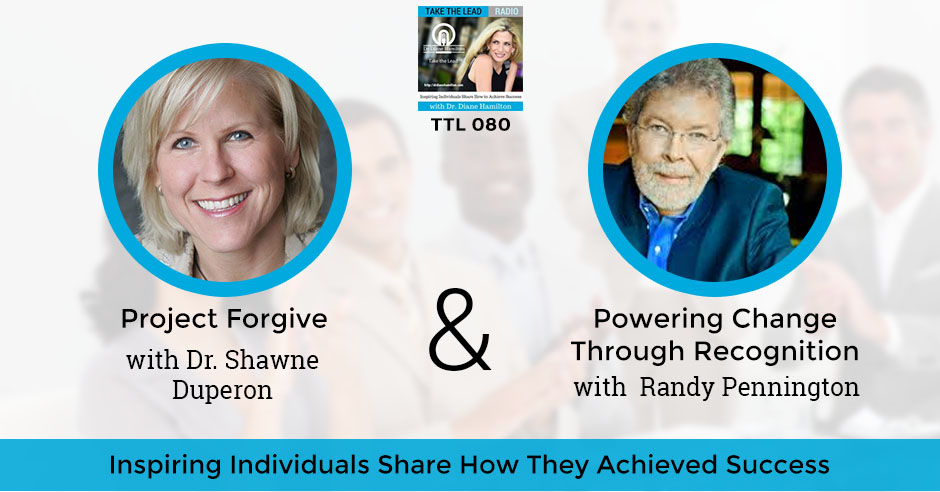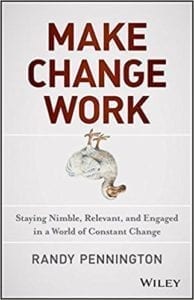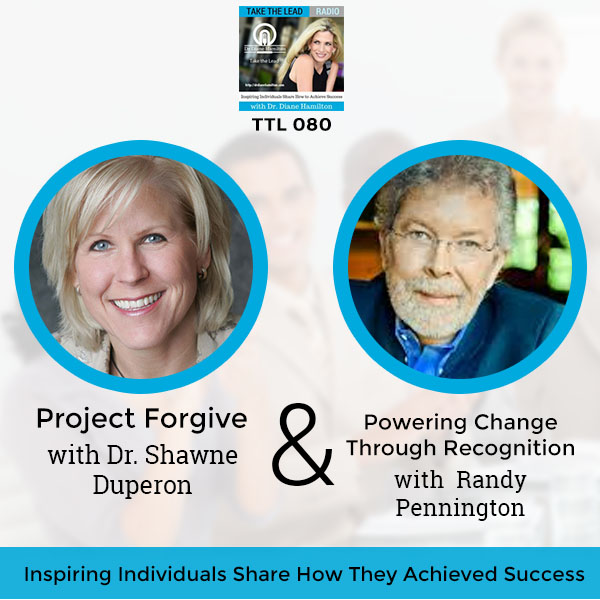Seeking for sponsors has never been so easy, thanks to the advent of Facebook and other social media sites. Facebook has even changed the definition of gossip into something positive. Dr. Shawne Duperon used this to her advantage to promote her non-profit non-religious foundation, Project Forgive. With the gossip theory, she was able to gather a huge social following that had an authentic discussion on forgiveness. Randy Pennington is an expert in helping companies build a culture that blows away the competition. Above all this, he believes that change can happen when we give recognition to people the way they want to receive it as opposed to how we prefer to give it. Learn how to solve this lack of engagement in the workplace to increase productivity.

Listen to the podcast here
Project Forgive: A Culture Of Change And Authenticity with Dr. Shawne Duperon
I am with Dr. Shawne Duperon, who is a six-time EMMY winner and a Nobel Peace Prize nominee who’s been featured in major media including CNN, ABC, Inc. Magazine, and USA Today. Dr. Shawne is considered by many to be one of the most innovative consultants in the world. She educates corporations, universities, government agencies, entrepreneurs, and everybody else how to communicate resulting in increased retention, engagement, and productivity in the workplace. Her case study is Project Forgive, a nonprofit and nonreligious educational foundation that reaches millions in social media and tens of thousands in her Facebook Live broadcasts. Nice to have you, how are you?
I’m tickled to be here and it’s a delight to meet you too.
You have done so many things. I mean six-time EMMY winner, Nobel Peace Prize. What is that like to be nominated for that?
There’s different things happen to you and you’re like you digest and move through it. The Nobel Peace Prize nomination that still hasn’t ‘kerplunked’ if that’s the right word. It’s so precious and so gracious and so honoring. It’s a difficult thing to be with. That’s a journey in of itself. What inspires me about it is that the work that we’re doing is being recognized and loved and appreciated because everything we do is free. It’s cool to be honored in that way.
The EMMY Award Winning is amazing in itself. You say you have a PhD in gossip. Can you just give me your background?
[Tweet “Gossip comes from the word ‘godsibb’, meaning close to God.”]I worked in the newsroom for years. I worked in the news for ten years. I got my Masters in Mass Communication while I was working in the news. I was producer and a reporter in NBC. After getting my masters, because the TV station paid for half of it, I saw some exquisite, interesting research on the phenomenon of gossip. One of the things that I learned is that gossip comes from the word ‘godsibb’, meaning close to God for goodness sakes. When you usually think gossip, you think mean and nasty. That’d not the case at all. That’s not what the research shows. That mean and nasty stuff is only about 5% to 7%. We’re actually really good people. Your radio show, one of the main reasons why it’s so successful is because people good gossip about it. They feel good when they come on. They get some individualized information. It feels authentic and charismatic to them and then they’ll gossip about it. That’s the way it works.
When I was looking at what you do and the gossip and all that, it reminded me of a Big Bang Theory show. They had an episode on memes. They would test how long it took for them to tell one of their friends in the group with something and it would get to the next level. If you think of social media, what impact it’s had on good and bad gossip? What have you seen in that in your experience?
We used gossip theory to make Project Forgive go viral. We did a little video. It went viral. Applying the basic theories and academia because gossip is primarily good. It’s a misnomer that we think it’s bad. That’s just our perception in culture. Applying those gossip theory phenomenon, we’re reaching 120 million a month in social media. People want authenticity. We bond when we gossip together. We have the same upset. A plumber came into our neighborhood. We warn our neighbor and say, “Don’t use that plumber. He’s going to take your deposit and not return.” That’s a bonding experience of gossip. Social media is just an exquisite way to express really beautiful things.
It’s so challenging for marketers to keep track of what is spread through different ways. I talked about this with other guests on the show because I find that it’s hard to know when you’re selling advertising and things like that where people got the message originally. How do you track it when it gets to so many levels? Is that something that people come to you for help with or do you deal with that at all?
I deal more in the realm of communication and engagement using gossip theory, how to engage your employees, how to engage in social media, how to engage charismatically when you’re speaking on a panel or giving a presentation or even a sponsorship speech. What you’re talking about is attribution software and it’s really easy to track, not just click through on a website, all different arenas or areas of your marketing, which larger companies do. It’s a very common practice with the larger companies. What we’re doing, particularly on Facebook, I always recommend to pick a platform that just feels good to you. Social media is about authenticity. It’s about being honest. It’s about being open. We just did a Facebook Live with one of the heads of Macy’s, the retail store. She gets on the Facebook Live with us and shares from her heart and has touched, moved and inspired us and has tears in her eyes, sharing about having to forgive herself because she just put her mother in a nursing home. It’s putting humanity and technology together, which is so beautiful. Everything we’re doing is all organic. We buy zero ads and that’s what a lot of companies haven’t been able to figure out how to do that, how to create that kind of engagement that people come back over and over and over again. We’ve mastered it.
How do you monetize? Can you just explain the whole foundation and everything that you’re doing?
There’s lots of ways to monetize. I made my model up. I know a few companies that are doing what I’m doing. What I decided from gossip theory was to get as much of a mass following and sharing like a tsunami of gossip around this conversation and forgiveness. I started to seek out companies for sponsorship to share about them in our Facebook Lives, to include them in some our postings, to find folks that write articles that would pay us to actually put up their articles that fit our brand like articles on anxiety and depressions. Articles on how to forgive your mother, she’s dying and you’re an incest survivor and you’re trying to work through steps like that. We have found some exquisite ways to monetize. One of my advantages of being a producer, I’m a television producer by trade, we have a documentary coming out and that’s all free. All of it is free and through our nonprofit. We’re also negotiating a TV show and we might be one of the first to do episodic television on Facebook because that’s where Facebook is going. Facebook is going to be a lot like Netflix where you sit and watch your episodes in smaller chunks, more like Steven Universe. It’s a cartoon on Cartoon Network and maybe episodes in six-minute chunk. We’re exploring that. It’s a brand new frontier.
I teach brand publishing and different ways of reaching people, a part of my work with the Forbes School of Business and other schools, which I teach. We’ve talk a lot about how to start businesses in that school and how to reach people and a lot of stuff that you do. Did you use crowd sourcing like Kickstarter or something to get your original ideas moving? Didn’t you start that way to get this thing up and running? How did you find this originally?
We did a Kickstarter campaign. We raised about $100,000 in about three weeks’ time. This is when those sites like Kickstarter and those kinds of sites were brand spanking new. No one had seen it before. It’s like being on that innovative trend to be able to say, “What is this?”Being an EMMY winning producer, it took me three tries with a video to make it took over. The first video was not successful. The second was a total flop. The third is when it actually pushed through and I’m an EMMY winner. I’m really good at production.
What was the difference in the third video?
Authenticity in the story.
Was this the story of the drunk drivers? Can you tell a little about that story?
The project came out of this nonprofit which is nonreligious. Gary, a good friend of ours, his family was killed by a drunk driver, his wife and two kids. My kids babysat those kids. Judy, the mother that was killed, was my husband’s business coach. It was a tough day for sure. Later that day, we found out the man who killed them was also a dear family friend. My children were even friends with his children. What are the chances? I get goose bumps every time I think about it. Both families are exquisite. Both families are loving. The man, Tom, who killed the family, he was out of state and they were actually doing an alcoholic intervention on him. They missed it by one day. It’s just this tragic and beautiful story because of Gary’s ability to move through this forgiveness and just the love that came from this. That’s where it came from. Sharing that story was what inspired tens of thousands of folks to make it go viral and gone into 100,000 to start us off.
You just don’t think that some of these things are going to happen. Had you thought of doing any kind of a production prior to this or did this just start a whole new path?
No, not even close. As a trainer, I do communication, media training, social media. The big theme of what I do is forgiveness. Taking risks as a leader, you’re going to screw up. It’s inevitable. You’re going to make mistakes. How quickly can you forgive yourself if you don’t keep repeating the same thing? Have you ever done that?
You try to at least make your mistakes new ones so you learn from them.
Sometimes you have to just grieve your losses. I’ve made a lot of my share of mistakes. This conversation of forgiveness, is always been a big prominent one for me. Personally, I’m an incest survivor and I share it very openly. I’m at that point where, “I love the person I’ve become because I really need some serious forgiveness and acceptance.”This car crash, I don’t want to call it an accident because when people drink and drive, to me, that’s not an accident. Even if it’s unconscious, it’s still a deliberate choice. This horrific crash spiraled me in the direction of really taking on forgiveness as a leadership skill and causing this all over the globe.

Project Forgive: When people drink and drive, to me, that’s not an accident. Even if it’s unconscious, it’s still a deliberate choice.
It could be something really horrible like that that leads to something wonderful like what you’re doing. At least you feel like this happened for a reason and at least it’s leading to something good. I’ve had people on my show, Cheryl Hunter, she’s been on my show. I’ve had others that have shared their stories. It’s amazing what people have done and survived who are able to share what they’ve done. It’s interesting that you had this producing background. Have you ever produced something similar or was it completely different from many things? What did you win your EMMY’s for? What type of things compared to this?
Documentaries. One of them was a public service announcement for the American Cancer Society, which was a beautiful piece. These people pop up saying, “I’m one. I’m four. I’m one and a half.” It was actually their cancer-free birthday. It’s just a beautiful PSA that go a lot of awards, including an EMMY. I worked a lot in the past on civil rights issues, LBGT issues. Diversity is a big platform for me and done quite a bit of documentaries. That’s why this documentary that’s coming out for free has been a very exciting for me. I originally thought it was going to go on TV and I’m thinking it’s going to be a Facebook trip because we want to be innovative in the releasing of video in social media platform. I think it’s going to do well.
You’re 100% releasing it through that means. How long is this Facebook release?
A 30-minute documentary. We’ll probably release it in four-minute story and also make it available in one large download for free. When I speak, I’d probably sell it so funding could go to Project Forgive, to go to the nonprofit.
I think it’s amazing how innovative you are. There’s one thing that you’re able to produce or you’re able to tell a story. You’re really innovative. You know all the cutting edge marketing tools. Do you hire people to help you with that or are you just good at everything?
I am not a techie. The mastery that I have is around fear and stepping into fear and allowing myself to forgive myself. To me, it’s not even about being brilliant. It’s not even being about being innovative. It’s about the capacity to be with your own humanity, the capacity to be with making mistakes and that you’re not a horrible person. It’s more the internal work. Even when you were saying these horrible things happen, you make the best of them. It happens for a reason. Everyone has had horrible crap happen to them or sometimes I like to say for them. You just make do. You figure it out. Sometimes it takes us longer to move through it and you might be bitter and angry for twenty years. I know people like that and it’s not good or bad. It’s just what your journey is here. I’m not even a proponent that you have to forgive. Everybody’s experience is different. Just honoring that difference and honoring it. Innovation is just an ability to let myself be scared and do it anyway.
[Tweet “Everybody’s experience is different. Just honoring that difference and honoring it.”]If you don’t need to forgive, do you promote that they accept apologies? Where do you stand on the apology situation?
The most prominent tool is called accepting the apology you’ll never received. That, to me, is the epitome of leadership. I have a neighbor that as soon as I see his face, I’m annoyed and I sometimes even just want to smack him. That’s not a very good thing for the forgiveness. People just get under your skin. That neighbor was like that for me. He’d do things like I go out to get the mail and he’d say something like, “Good morning, Shawne.” I’d be like, “Bob, 6:00 PM.” He’d say, “I know, but you look like you just got up.” This is the beauty of it. The technique or the tool that we now use in Project Forgive and I use as a trainer is called accepting apology you never receive. In my mind’s eye, we’re accountable for who we’re being in our own responsibility. This neighbor, his experience of me, if he would gossip about me is that I’m the ‘B’ word. “She’s so angry and annoyed all the time.”
Here’s the thing though, I didn’t want to be experienced as that. That wasn’t a fit for me and who I am. This is where this technique came from. Whenever I’d see him, I pretend in my mind that he’s apologizing. He’s not going to do it. He’s not even aware. He’d say something in my head like, “I’m so sorry. I say the dumbest things in public. I’m so socially awkward. The truth is I just really want you to like me. Will you forgive me for some of the dumb things that come out of my mouth that’s so awkward for you?” That’s where the miracles come from, when you shift yourself.
I’m glad you brought up miracles because I noticed you said this is a nonreligious film. What you work with is not religious-base. I’ve seen you listed a few places like that. Is there a reason why you mentioned that? Do you think it turns people off if they think it’s religious or is there some reason behind that?
We get thousands and thousands of requests for information weekly. A lot of the requests are around religious information or sharing religious information. We made a pact, the group of folks that became a part of this, that we are inclusive. We are nonpolitical. We are nonreligious because we are not excluding any religious group or any political party. This is not conservative or liberal. We want to be inclusive so people feel safe to share and talk. It’s about being non-divisive. A lot of times, bringing these conversations into corporation, they have an aversion to religiosity, which I would agree in the corporate world. I love going to the corporate world because that’s where we spend our most time is at work.
It’s interesting to see how much people have in common more than they think. There’s an ad where they get everybody that’s experienced this come over here and stand together. They would get people that would normally hate each other to agree that they had things in common. It seems like this would be that same type of thing. Do you find people that normally would not want to talk to one another bond through this experience?
I do. The TV show we’re creating is surrounded around this conversation. You are spot on, Dr. Diane because we really are 99% more alike and we have that 1% difference when it comes down to biology, when it comes down to caring about our family. We are very much alike. Sometimes our skins are a little bit different. We have different body parts.
Since you’re a producer, I’m curious what you think how media is helping or hurting to get people closer together. What do you think of the latest with the political climates and things of how people have been divided?
This is based on my experience, my academic background. I don’t have any scientific research to say it’s so. First of all, what’s happening now is needed and necessary. It’s like a splinter popping this upset and anger that has been going on for decades. We finally found a conversation, globally, that will make the sliver pop out. That’s a very good thing. Second part of it is what happened is particularly for online media or publishing houses really struggling to make ends meet. They started doing advertising online. The fake news, if you will, saw these opportunities to do this online sharing and they became news organizations because there’s a lot of money to be made in online advertising. In some ways, the news media, in my world, bought this on because they created this convention and the system of being able to have ad revenues on your media pages. I can go on the Wall Street Journal and not one of the fake news site and the advertising looks the same, and both are annoying. They’re going to have to fight for their reputation and I’m cheering them on because to me, it’s worthy. We’ll see how this evolves.
Do you think we’ll get to a point where we have felt all real news or do you think this is just the way it’s going to be?
If I were to guess, I would say we’re braver sitting at our computers. I think you’re going to see more and more broadcast stations of individuals sharing news. I don’t know what’s going to be true or not. I think it’s going to get messier before it gets better.
It must be really challenging to have really young kids now. My girls are 30 and 31 at this point and I’m past all that worrying about what they can see. I imagine it’s very challenging for parents of what the exposure is to younger people. How do you control that?
Doesn’t every generation has its issue? What they have to deal with these days? The opioids, the drug situation is horrible. We’ve ever faced this type of epidemic. There’s lots going on that’s different from our generation to this one. Let’s see how innovative they get.
Do you think we’ll still have a four-year degrees? We’ve done that because that’s what employers value. Do you think they’re going to continue to want that or do you think we’re going to see more bits and pieces of content and information? Like what you’re saying on Facebook, we’re going to start having people getting bits here and there of knowledge.
I do think loyalty is going to deeply shift even farther away. The days of being at a company for 30 years will be gone because so many folks are working at home. That’s becoming a major trend. Maybe working for many companies at home. The thing that I think is going to be really critical is the evolution of healthcare. Healthcare is going to force people to make decisions around how they want to operate because if they don’t have healthcare they might be getting three or four jobs at home to pay for their healthcare. Healthcare is going to be a critical conversation and how this industrial digital age trends transform.

Project Forgive: Healthcare is going to be a critical conversation and how this industrial digital age trends transform.
I worked for AstraZeneca for twenty years and most of it was in pharmaceuticals. I was watching a video recently of Peter Dayan. He’s talking about the future of healthcare in different technology and what’s going to be available. The whole thing is going to completely change and it will be an equalizer in some ways. I’m glad I’m not going to be a physician and going into medical school. There’s a lot of growth opportunities. It sounds like a lot of it’s going to be AI-based. Thank you so much. Dr. Shawne for being here. How can people reach you if they want to find out more about you?
I would definitely send them to Facebook.com, Project Forgive. Check us out on our website and see what we’re up to and doing and to bring me in as a trainer. I’m at DrShawne.com. Most inspired coming onto Facebook.
Thank you so much.
You’re welcome.
Project Forgive: A Culture Of Change And Authenticity with Randy Pennington

Project Forgive: Make Change Work: Staying Nimble, Relevant, and Engaged in a World of Constant Change
I am here with Randy Pennington, who is a business performance veteran, author, and expert in helping organizations build a culture focused on results. He has a long client list that includes leading organizations and business, nonprofits and government. His ideas and comments have appeared in the New York Times, Entrepreneur, Executive Excellence. He’s on CNN, Fox, BBC, ABC. He’s a Speaker Hall of Fame inductee. He’s got several books. Make Change Work, On My Honor, I Will: Lead With Integrity in Changing Times, and Results Rule!: Build a Culture That Blows the Competition Away. Welcome, Randy.
Thank you. It’s a pleasure to be with you.
I had so much fun interviewing Joe Calloway, Mark Sandborn, Scott McCain, Larry Winget. You are quite a group interesting guys.
The four of them are truly some of my very best friends in the world and we all met in this business. We all found ourselves emailing each other. In fact, we email each other typically two or three times a day. We started sharing ideas and then all of a sudden we said, “Let’s take this a little more public.”The notion of the Five Friends came about and then the business summit. We enjoy each other. We don’t always agree with each other, but we always enjoyed each other.
I know you go to the NSA events. I saw that did a change session in Austin. Was that last year?
They had me do the opening for the Winter Conference to talk to tee up the notion of change what it means in your career and how you continually have to change. The guys were nice enough that they all showed up and did the introduction for me at the session. It started off with, “I’m going to do this. Maybe you can send a video clip.” They all said, “Why don’t we just come.” They showed up and I did the session.
You talk about giving recognition and the importance of recognition of some of your talks. You also talked about change. I want to combine that and ask you how do we need to change how we recognize people.
[Tweet “People just do their job. The job is the recognition. They get paid. They don’t need any recognition.”]I do talk a lot about what I’m dealing with leaders about recognition. I was working with one of my clients, a large utility company in the southeast. I had gone on about the importance of recognition. They all said, “People are just do their job. The job is the recognition. They get paid. They don’t need any recognition.”One of the senior execs stepped out for another meeting and he told me, “I have to step out. I don’t want you to think I’m just leaving the session.”He came back about twenty minutes later and he raises his hand and said, “I have a confession to make. I need to stop the session. I am guilty of deathbed recognition.” I was like, “This is going to be interesting. Let’s see where this goes.”He said, “I left here and went to the going away party of a young engineer who works for the company. We had the gathering and I shook his hand and I said to him, “One of the things I’ve always appreciated about you working here is that I could give you something and I never had to worry about it being done right or being done on time.””The young engineer looked at the senior executive and said, “If you told me that 90 days ago, I’d still be here.”
The guy said, “I’m guilty,” on his way out the door. It’s like the last time you see somebody, that’s the first time you told them that you love them. One of the reasons why recognition is so important is first off, I don’t think anyone that I’ve ever met has ever received too much legitimate recognition for the good work that they do. It’s just a matter of letting people know that you appreciate them. It pays lots of dividends to accompany when they do this. But to your question how do we need to change the way we give recognition? The most important thing, first off, is to change the fact that we would actually do it on a regular basis. Even a broken watch is right twice a day. It’s our job to find at least one of those times and say, “That’s good.”We know that what gets reinforced gets repeated. The change comes down to giving recognition the way other people need to receive it rather than the way we prefer to give it.
We always thought of the golden rule, but it’s really more about what people want than what we want.
I do spend a lot of time speaking. I spend a great deal of my time, probably 50% working with companies internally on how do they change, how do they transform, how do they change their culture, how do they create more engagement. One of the things that I see in companies is everyone says, “We’ll give them a certificate, we’ll give them a plaque, we’ll give them recognition, we’ll give them whatever.” There are people out there who crave that and love it. If you went out on the interstate and you bought a billboard and you put their photo on it, surround it with neon lights with the words ‘Employee of the Millennium’, there are people out there that that might not be enough. But there’s a lot of people who would say, “That’s the worst thing you could ever do to me. That’s the most embarrassing thing ever.” They would much prefer a one-on-one thank you.
While we tend to think about recognition and reward, recognition doesn’t have to cost a great deal of money. We just have to get out of our own head and think, “I’m going to spend five minutes with this individual. What’s the best way to spend that five minutes that truly lets them know that I appreciate who they are, what they do in most important, what they contribute?” I wrote this book, Results Rule! and I’m a real firm that you reinforce effort, but you recognize results.
You talk about craving recognition and they say millennials want to be recognized seven times a day. You see all these different statistics. I was thinking about this woman I worked with who made it very clear that she loves to receive gold stars. Everybody sends her little gold buttons all the time because she made it very clear. A lot of people don’t really tell you unless you ask. I think a lot of people forget to ask or don’t think about asking and they just assumed that they share the same values. I think that there’s a lot of cultural issues that I hear through people that I talk to on this show and outside of this show. I think some of it starts at the top. The CEOs need to build the culture. How do you get a CEO to recognize that they need to fix the culture if there’s a problem?
Sometimes it’s hard. The first thing we have to get CEOs, and really every leader doesn’t matter if you’re leading a company or you’re leading a team, is every group has a culture. You can’t not have a culture. The only question is does the culture that you have support where you’re going today and will empower and engage and energize you to go where you need to go, where your organization or team needs to go tomorrow? I try to bring the culture back to the business because the culture in business always wins. You can have a great strategy and a mediocre culture and the culture would win. On the other hand, you can have a mediocre strategy, but an amazing culture and the culture will find a way to achieve success.
When I talk to businesses and business leaders, a culture tends to be squishy. One of my clients calls it, “This is the squishy stuff we do.” I said, “It is squishy, but it’s the squishy stuff that pays the best dividends. It’s the intangible that makes the difference.” Herb Kelleher, the founder and now Chairman of the Board of Southwest Airlines, former CEO of Southwest, he said, “If Southwest Airlines ever loses that intangible, that Southwest spirit, we will have lost our most important competitive asset.” It is because what we’re talking about is creating an environment where people give discretionary effort and discretionary commitment. That’s what the culture gives you.
[Tweet “It is squishy, but it’s the squishy stuff that pays the best dividends. It’s the intangible that makes the difference.”]We talk about being accountable, but how do they become more accountable? How do we know if they are?
Accountability is about ownership. Truthfully, accountability is about ownership. One of the ways you know that you have an accountability problem is look at it from that side first. You know you have an accountability problem when no one will accept responsibility for anything. When you have people blaming other people, blaming circumstances, blaming this or that or something else as opposed to saying, “This was my responsibility.”On the other side, you know that people are getting accountability correct when people take ownership of it, when they say, “This is mine, I own it.” I did a Facebook Live broadcast to our group called the Ultimate Business Summit Insider group that Larry Winget, Scott McCain and I work with on a regular basis. I did a post for them where I talked about bad service. I said, “One of the things that made it bad, not that they thought that people made a mistake, is that no one’s stepped up and said, “I own the mistake. We made the mistake.”
As a company, as a leader, when you see people blaming others, scapegoating others, throwing their team members under the bus, that’s when you know you have an accountability problem. The way you fix that is you want an environment where people say, “I own this. Not that I always get it right, but I always own it. I own it when it’s right and I own it when it’s wrong.”Part of that goes back to recognition. When you give people recognition and you say, “This is really great” and they go, “It’s not such a big deal.” No, that is a big deal. You need to own that. You need to accept it. Likewise, when it doesn’t go well, you need to accept that too. That ownership that causes people to not accept recognition is the flip side of the ownership that causes people not to be accountable and responsible for delivering the results they promised.
We hear a lot about people saying they want to get to the next level. How do you even know where you are to begin with to know if you’ve reached the next level?
People always thought, “I want to get to the next level.” First off, I always believed there’s a next level. The kiss of death in business or in your career is assuming that you were at the top level. Someone asks me in an interview, “What’s the best thing that you’ve ever done in your career?” My response was, “I haven’t done it yet.” I believe that we’re all in a constant battle for relevance in the marketplace. What it takes to remain relevant in the marketplace, we’re talking about the marketplace for jobs, the marketplace for your product or your service, is to realize that past success proves that you were right once.
There are the two questions that I started asking my clients to pose to themselves, what else and what’s next? A lot of times in business, we talk about find your ‘why’. I want to know, first off, what else? What else can I do to show value and provide value and add value to my customer?
You and I are from a generation that we’ve seen quite a bit of change. What worked in the past isn’t always continued to work. I love that you’re doing Facebook Live. There’s so much new technology. Is it challenging at all for you to figure out what the next new thing is, to learn all the new innovation in technology?
I’m probably a geek at heart. I like this stuff. The hard part for me is to always think about how I use it to add value. That’s the part of the ‘what else’. A lot of the people that are my clients are not on LinkedIn every day. They’re not on Twitter every day. They don’t do Snapchat at all. They don’t do Pinterest at all. My challenge is when I say, “What else?” I think of this is it’s not what else that’s fun and interesting and unique for me. It’s what else that adds value to my customer and to my client. I have to go back in and frame all of that ‘what else?’ through that. The second question is what’s next?
What’s coming next that could totally disrupt my industry, my client’s industry, the way we do things? What’s coming next? I firmly believe that there’s only two reasons that you get disrupted in business. One is there’s a crisis. One of them you can’t really control, you can only mitigate. Earthquake or hurricane, somebody hacks your computer, whatever that might be. That’s a disruption that you can’t control a lot of. You can only mitigate. The second kind of disruption, the kind of disruption where you’re rendered obsolete in the marketplace, that’s just because you’re lazy.
I’m fascinated by how you get to be so good. I ask Joe and some of the other about this. How do you get to this level? Do you have a really great event that you attended or something that you saw that just stood out in your mind as something that was unusual of your speaking events? Do you have an event that you attended as a speaker that stands out?
There’s probably one or two, but I want to go by first off how do you get good? You started off by not being good and you continue to work every day. That’s how you get good. You have to have stage time. You have to practice. You have to be intentional about this. I hear a speaker say all the time, “I just stand up on stage and wing it.”No, you don’t. You go to the dentist. Do you want your dentist to walk into your exam room and go, “I’m just going to wing it today.” The first thing is you get really good by being very intentional and you work at it.

Project Forgive: How do you get good? You started off by not being good and you continue to work every day.
The one that stands out for me that I had really the most fun at was about a year and a half ago. I was invited to New Zealand to speak to all the school board elected officials in the country of New Zealand. It was so cool because not just the fact that it was in New Zealand, that was nice too. The topic was culture and what they were trying to figure out is how do we create a culture of excellence within our communities and within our schools because we realized that the culture that we create within our school and our community has a direct influence on the ability of our children and our children’s children to succeed in the world tomorrow. I thought that was so amazing. There was about 850, 900 people there. I have 900 people there absolutely focused on and interested in how do we create the culture today that sustains and empowers our children and our children’s children tomorrow.
You get these inspirational stories of people when you go around and speak and everybody affects you in different ways. How do you express the importance of the people delivering results? I like your story about the band with the t-shirt sold.
I was at a concert. It was an outdoor concert, 20,000 or so people there. This was a very well-known band at the time. I walked in and I talked to the t-shirt guy. I said, “How you doing? How’s it going?” He said, “This is going to be great. We’re going to sell out. We’ll probably sell up all of our shirts within the first half hour. We didn’t bring a lot of product.”As I’m walking out, he’s packing up about half of this product and I said, “How was your night?” He said, “This audience sucks. They didn’t buy anything.”I said, “You think it had anything to do with the fact that your lead singer forgot the words to your most popular song and had to start over again? Do you think it had anything to do with the fact that he was drunk and cursing and pouring beer on the monitors on the stage because he didn’t think the sound was right? Do you think it had anything to do with those things?” He said, “No, this audience sucks.”
First off, that’s an accountability issue. That’s not understanding cause and effect. You do a bad show, people don’t buy your stuff. For business, it’s the same thing. You offer bad service, people don’t continue to buy from you. There is a cause and effect that goes with that. You may not like the cause and effect, but people reward and acknowledge results. There is a reason why there’s only one best picture. There may be several nominations, but there’s only one person that gets the award. It’s because someone wins. One of the things I hear about millennials, which I don’t necessarily believe, is that everybody has to win. No, I don’t think millennials believe everyone has to win. They know that there are winners and losers in the world. That doesn’t mean just because I wasn’t first that I didn’t do something that’s worth recognition.
I get so many people that ask me how to reach millennials. Do you have any words of wisdom there?
If you love millennials or if you hate millennials, realize that as a society, it’s our fault either way. Either you love them or hate them. I happened to work with a number of really great millennials. They’re different than me. What they want is someone who will understand where they are. Their experiences are different, but their experiences are their experiences. My advice to people is you have to figure out how to adjust yourself because they’re not going away. You can say, “I don’t want to work with millennials.” You can say, “I wish they weren’t there.” It doesn’t matter. They’re the majority of the work place today and they will be 50% of the workplace within about the next three to five years and they’re not going away. Part of it is to understand, yes, there are things that they don’t do particularly well. You have to coach them around that, but there are many, many things that they do exceptionally well. Use that.
They’re the first true digital natives. They understand how to work in teams. They want to succeed. They’re looking for mentors, but they’re looking for mentors that will help them reach their goals, not remind them about how bad it was that you had to walk uphill the school about six miles each way in the snow. They don’t want to hear that. They want to hear, “How do I shortcut?” One last thing is a lot of millennials grew up playing video games. One of the things that you learn in a video game is there’s always a shortcut between one level to the next. A lot of the questioning is “How do I get the shortcut?” We have to be very honest with millennials. If there is a short cut we can show them, but as my friend Joe Calloway says, “Don’t learn the tricks of the trade. Master the trade.” That’s where we have to coach them to understand how that works.
Thank you so much for being on the show.
I so much appreciate the opportunity.
I think a lot of people want to know how they can reach you and find out more about your books and everything. Can you give a website?
My personal website is PenningtonGroup.com. You can find out about me there. The Ultimate Business Summit Insider and the Ultimate Business Summit to find out what a few of us are all doing together around that. The website is named UltimateBusinessSummit.com. Pennington Group, you find out about me. Ultimate Business Summit, you find out about all of us.
Thank you so much.
About Dr. Shawne Duperon
 Dr. Shawne Duperon is a six-time EMMY® winner and Nobel Peace Prize Nominee, who has been featured in major media including: CNN, ABC, Inc. Magazine, and USA Today. Shawne is considered by many to be one of the most innovative consultants on communication today. Shawne educates corporations, universities, governments and entrepreneurs, on how to effectively communicate resulting in increased retention, engagement and productivity in the workplace. Her case study is Project Forgive, a non-profit and non-religious educational foundation that reaches millions in social media and tens of thousands in her Facebook Live Broadcasts.
Dr. Shawne Duperon is a six-time EMMY® winner and Nobel Peace Prize Nominee, who has been featured in major media including: CNN, ABC, Inc. Magazine, and USA Today. Shawne is considered by many to be one of the most innovative consultants on communication today. Shawne educates corporations, universities, governments and entrepreneurs, on how to effectively communicate resulting in increased retention, engagement and productivity in the workplace. Her case study is Project Forgive, a non-profit and non-religious educational foundation that reaches millions in social media and tens of thousands in her Facebook Live Broadcasts.
About Randy Pennington
 Randy Pennington is a business performance veteran, author, and expert in helping organizations build a culture focused on results. His client list includes leading organizations in business, nonprofits, and government. His ideas and comments have appeared in the New York Times, Entrepreneur, Executive Excellence, and numerous professional and trade journals, and on CNN, Fox News, the BBC, and ABC radio. He was inducted into the Speaker Hall of Fame and is the author of Make Change Work, On My Honor, I Will: Leading with Integrity in Changing Times and Results Rule! Build a Culture that Blows the Competition Away.
Randy Pennington is a business performance veteran, author, and expert in helping organizations build a culture focused on results. His client list includes leading organizations in business, nonprofits, and government. His ideas and comments have appeared in the New York Times, Entrepreneur, Executive Excellence, and numerous professional and trade journals, and on CNN, Fox News, the BBC, and ABC radio. He was inducted into the Speaker Hall of Fame and is the author of Make Change Work, On My Honor, I Will: Leading with Integrity in Changing Times and Results Rule! Build a Culture that Blows the Competition Away.
Important Links:
- Shawne Duperon
- Project Forgive
- Facebook – Project Forgive
- Steven Universe
- Forbes School of Business
- Cheryl Hunter
- American Cancer Society
- Wall Street Journal
- AstraZeneca
- Peter Dayan
- ShawneTV.com
- Randy Pennington
- Make Change Work
- On My Honor, I Will: Lead With Integrity in Changing Times
- Results Rule!: Build a Culture That Blows the Competition Away
- Joe Calloway
- Mark Sandborn
- Scott McCain
- Larry Winget
- Five Friends
- NSA
- Winter Conference
- Herb Kelleher
- Southwest Airlines
- Ultimate Business Summit Insider
- PenningtonGroup.com
- Ultimate Business Summit



0 Comments